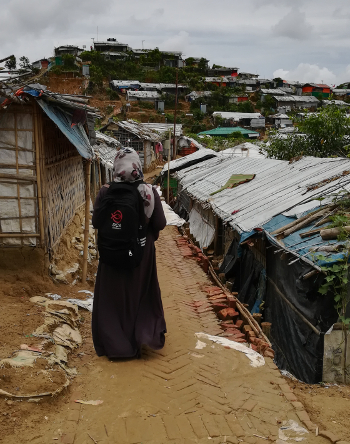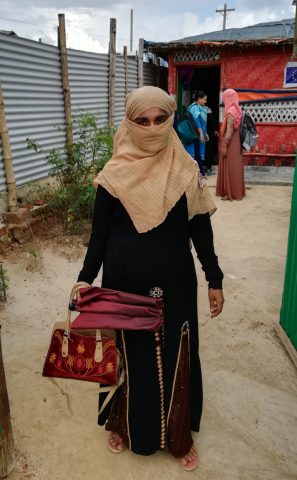Women professionals around the world have to fight daily battles besides ‘just’ performing in their jobs
Every year on August 19th we celebrate World Humanitarian Day. The purpose of this day is to raise awareness of the efforts of professionals supporting people in crises around the world. This year’s theme is dedicated to Women Humanitarians.
By choosing this particular group we want to honour women’s tireless efforts to help people in need and shed light on additional challenges that women in particular face.
Being away from friends and loved ones are issues all humanitarians face, women however have to tackle additional challenges and risks. These range from not being taken seriously as a (young looking) woman in often highly patriarchal societies and work environments, conflicting social norms and additional security threats, including all forms of gender-based violence. National colleagues and refugee volunteers frequently find themselves in the toughest spots and at the same time remain often unseen and unheard. It is about time to share their stories. Because these women just rock!
I have the gratifying pleasure of currently working in a female only team of roughly 60 Bangladeshi and Rohingya women on a programme that provides educational opportunities to female Rohingya refugees over the age of 14. Interviewing some of these amazing women for this blog has once more revealed the daily battles many women professionals around the world have to fight besides ‘just’ performing in their jobs.
In both the Rohingya and Bangladeshi communities’ girls as a rule drop out of school when they get their period or get married. This interruption in their education automatically makes it harder for women to get a job, particularly in senior positions. If a girl drops out of school because of getting married, she subsequently often spends her days doing household chores and caring for her husband, children and in-laws, consequently family support is of uppermost importance and anything but to be taken for granted.

Tamara walking through camp on her way to a home-based learning session.
The aforementioned circumstances were also Tamara’s reality when she got married as a 17-year-old girl. Yet, her life has changed a lot since then. Now, aged 25 years, she says ‘I am an empowered woman now and people see that I bring home good money’. The journey to this point was hard, and she nearly gave up more than once. Some of her family did not approve the path to a career that she chose, and she is still struggling to meet expectations, both her familiy’s and her own. Tamara was fortunate to have a husband who supported her through those challenging times.
Dipa is another DCA staff member who has always been supported by her family, but still faces a hard time with not always being there for her family as this is what is expected from her as a daughter. Work life balance is even harder if these expectations are higher.
A supporting family is a luxury Rohingya DCA volunteer Fatima can only dream of. After getting married at the age of 15 out of love, she was abandoned by her family. Marriages are normally arranged by a girls’ parents in her community. Fatima now lives with her 3-year-old son in one of the refugee camps in Southern Bangladesh. Her husband left her for another women, staying in the same area as she does, thus bringing even more shame on her. Support from him or her family cannot be expected. Fatima, however, still feels guilty and obliged to support her family, as this is a daughter’s duty.
Besides social norms that make it harder for women to have a career of their own, security is often a major issue. Fear of sexual harassment is also often used as an argument to limit women’s movements in order to protect them and at the same time reinforces traditional social norms. My female colleagues are harassed for not fully covering themselves, being on the road on their own after dark, being unmarried, for working, etc. While I am lucky enough not to understand what is being said and ‘only’ have to deal with unpleasant glances, my native colleagues do understand all these undermining comments. This leads to a general feeling of insecurity.
So what drives them on to still keep going, to still keep on fighting?
“Over 50% of the population in the Rohingya community are female. We as women have to help them and ensure women have access to facilities and services”, shares Dipa her opinion when asked what motivates her as a woman to work in this field.

Fatima leaving the Women and Girls safe space to go home to her 3 year old son.
Others insist that it is their responsibility to support the most vulnerable and at the same time very rewarding when walking through the camp and feeling the support of the refugee community. Fatima and Sayema, who are volunteers from the Rohingya community and teach Burmese at DCA centres, tell us how much they enjoy coming to the Women and Girls Safe Space where they feel safe and protected. They are both teachers and participants at the same time, passing on their knowledge in Burmese, while improving their skills in other areas. Furthermore, they feel proud of getting educated. Sayema informs us that her family respects her as she can help them now with their documents.
‘Education can empower people and I feel a responsibility to help the Rohingya’ says 25-year-old Tamara working as a teacher in the refugee camps in Southern Bangladesh.
Involving women in each and every workplace, especially in the field of humanitarian work is essential as it eventually changes societies. In a community where women were not allowed to leave the house on their own, you can now see women in all kinds of different positions, from front line field staff up to managing positions. I am deeply convinced that despite the fact that we as a community still have a long way to go to not only ensure women have the same opportunities on paper but supporting them in tackling the additional challenges, it’s us who set the ball rolling. However, organisations have to undertake responsibility in acknowledging the existing inequality and better support women at all levels in pursuing their careers. It is time for a change!
Petra Weissengruber
The writer is an Education in Emergencies Professional, currently working as Education Programme Manager for FCA (seconded to DCA, FCA’s partner) in Cox’s Bazar, Bangladesh.
